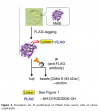The Potential Role of NFAT Inhibitors in Cancer Therapy
In the complex and ever-changing field of cancer, scientists are constantly exploring new treatment strategies and targets. In recent years, NFAT (Nuclear Factor of Activated T-cells) has garnered significant attention as a potential target for cancer treatment. Particularly, inhibitors targeting NFAT, such as the VIVIT peptide, have become focal points in cancer research. As a global leader in high-performance life science products, Glpbio's exploration and innovation in this field have unveiled the immense potential of NFAT inhibitors in cancer therapy.
Fundamentals and Characteristics of NFAT Inhibitors
NFAT inhibitors, especially the VIVIT peptide, are cell-permeable peptides that inhibit calcineurin-mediated NFAT dephosphorylation, thereby preventing NFAT's nuclear translocation. This selective inhibition can last for 24 hours, significantly impacting NFAT function in immune cells. Long-term VIVIT treatment can also markedly reduce levels of proteases such as proteinase K, TRAP, and MMP-9 in the cytoplasm, which play crucial roles in cancer invasion and metastasis.
NFAT and Its Connection to Cancer
While the role of NFAT in the immune system has been widely studied, its role in cancer remains relatively mysterious. Recent studies indicate that NFAT inhibitors are abnormally expressed in various cancer types and are closely associated with malignant behaviors like cancer proliferation, invasion, and metastasis. Therefore, NFAT inhibitors hold promise as new cancer treatment strategies.
Potential Roles of NFAT Inhibitors in Cancer Therapy
Inhibiting Cancer Cell Proliferation
Proliferation of cancer cells is fundamental to cancer development. Studies have shown that NFAT is abnormally activated in many cancer cells and promotes their proliferation. NFAT inhibitors, such as the VIVIT peptide, can effectively inhibit NFAT activity and thus suppress cancer cell proliferation. This discovery provides a new approach to cancer therapy.
Blocking Cancer Invasion and Metastasis
Cancer invasion and metastasis pose major challenges in cancer treatment. Proteases like proteinase K, TRAP, and MMP-9 play key roles in these processes. NFAT inhibitors can significantly reduce levels of these proteases, thereby blocking cancer invasion and metastasis. This discovery offers new treatment hope for patients with advanced cancer.
Enhancing Immunotherapy Effectiveness
Immunotherapy has become a hot topic in cancer treatment in recent years. However, the effectiveness of immunotherapy varies among patients, with some showing no response. Research indicates that NFAT plays an important role in the differentiation and function of immune cells. By using NFAT inhibitors, immune cell activity and function can be regulated, thus enhancing the effectiveness of immunotherapy. This discovery provides new optimization strategies for immunotherapy.
Glpbio's Innovative Development in the Field of NFAT Inhibitors
As a global leader in high-performance life science products, Glpbio's exploration and innovation in the field of NFAT inhibitors undoubtedly reveal their immense potential in cancer therapy. Glpbio offers a variety of research reagents, including NFAT inhibitors, with excellent purity, stability, and bioactivity, providing reliable support for scientists researching NFAT's role in cancer.
Diverse Product Line
Glpbio currently offers more than 20,000 life science research reagents, covering 20 popular research fields such as cancer, neuroscience, anti-infection, and epigenetics. Among them are various signaling inhibitors and chemical small molecules, including those targeting NFAT, providing scientists with a vast array of research tools.
Continuously Expanding Compound Library
To meet the latest research needs, Glpbio continuously expands its compound library, adding popular inhibitors and agonists from various fields weekly. This constant innovation and expansion provide strong support for research on NFAT inhibitors in cancer therapy.
Excellent Product Quality
As a supplier of inhibitors in the life science field, Glpbio prioritizes product quality. Its core philosophy is to "ensure the quality of every product," committed to providing comprehensive research materials and reliable product performance for biomedical research. This strict quality control ensures that scientists can obtain accurate and reliable results when using NFAT inhibitors in cancer research.
In conclusion, NFAT inhibitors hold tremendous potential in cancer therapy. By inhibiting cancer cell proliferation, blocking cancer invasion and metastasis, and enhancing the effectiveness of immunotherapy, NFAT inhibitors offer new treatment hope for cancer patients. As a global leader in high-performance life science products, Glpbio is dedicated to providing scientists worldwide with more innovative research reagents, helping them achieve significant scientific discoveries faster and contributing more to human health.












Commentaires